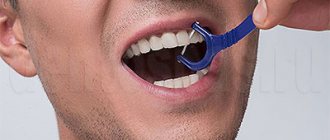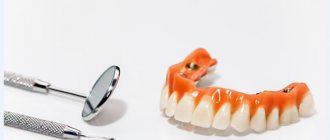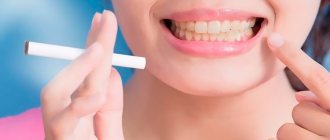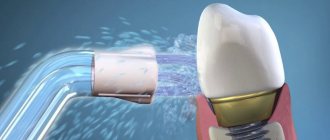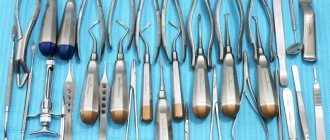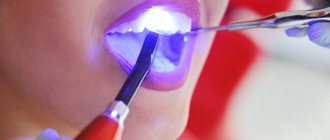Content
- What are the dangers of improper crown care?
- What to do after installing crowns
- When to see a doctor
Crowns are the most popular method of restoring damaged and lost teeth. Following the rules of care will help keep your teeth beautiful and healthy after dentures. Despite the fact that the tooth is artificial, plaque continues to accumulate on it. Also, do not forget that there are neighboring living teeth and soft tissues that may be damaged due to careless handling.
PROMOTION
Installation of crowns, dental bridge
RUB 3,450
What determines the duration of the adaptation period?
The first question that arises among patients is: “How long will the process of getting used to removable dentures last?” It is difficult to answer this question unambiguously, since for each patient the adaptation period follows an individual scenario. The following factors have a significant impact on the duration of adaptation to removable dental structures:
- — Quality of fixation. If the prosthesis is not fixed well enough, unforeseen complications will appear during the adaptation period. In this case, displacement of the structure is inevitable, resulting in injury to the delicate mucosal tissue.
- — Type of prosthesis and its dimensions. Adaptation to different designs occurs in different ways. For example: getting used to a large removable denture is more difficult than getting used to a small partial denture that replaces only a few teeth.
- — Condition of the mucous membrane. The presence of injuries and foci of inflammation in the oral cavity will cause a delay in the process.
- — Individual characteristics of the body.
If there are symptoms of jaw tissue atrophy due to a long absence of teeth, the adaptation period will be longer and more difficult. The patient’s psychological mood also plays a significant role. If he is very worried and removes the system too often, the adaptation period is delayed indefinitely. On the contrary, patients who think positively get used to the prosthesis much faster and experience complications less often.
When addiction takes longer
The average duration of the adaptation process to removable dentures reaches one month (minimum 10 days). But in some cases the time frame extends to several months. The reasons for this phenomenon may lie in the following factors:
- — Mobility of the prosthesis due to poor fixation.
- — Complete edentia, due to which it is necessary to fix the removable structure in the mouth using suction.
- — Individual features of the jaw structure that complicate the process of adaptation.
If excessive mobility of the prosthesis occurs due to depletion of bone tissue, an adhesive gel will help solve the problem. With its help, you can securely fasten the denture to the gum, preventing its sudden displacement when smiling, talking, or while eating.
For severe jaw atrophy, specialists at the DiplomatStom Dental Clinic prefer to use soft nylon dentures. Thanks to their unique properties, they are securely attached to the gums without damaging sensitive tissues.
To get used to it as quickly as possible, you need to follow the rules of wearing a removable structure, carefully monitor oral hygiene and listen to the dentist’s recommendations. If you have any doubts, it is better to immediately consult your doctor. The specialists of the Dental Clinic are always ready to listen and answer all questions.
What happens after the prosthesis is installed?
From the moment the structure is first installed in the oral cavity, the adaptation period begins. At first, getting used to removable dentures is associated with a lot of unpleasant sensations. Patients most often experience the following complaints:
- - Vomiting. They arise as a natural reaction of the body to the presence of a foreign object in the mouth that is not food. As a rule, these sensations go away on their own after a certain time. But in some cases, if the patient has increased sensitivity, it is necessary to abandon the removable denture. In such a situation, fixed prosthetics on implants is indicated, which does not cause such sensations.
- - Increased salivation. This is another normal reaction to having a foreign object in your mouth. It involves preparing for the digestion of food. But the opposite reaction is also possible - constant dry mouth, which causes no less discomfort. How to get used to such sensations? Specialists from various medical institutions, such as the DiplomatStom Dental Clinic, advise to be patient - the addiction process will soon be completed, but if desired, you can speed it up using various methods.
- — Changes and a strong decrease in taste sensations are the inevitable consequences of wearing removable structures. The fact is that, unlike fixed prostheses on implants, such systems have an extensive base that covers a significant part of the receptors located on the mucosa. For this reason, it is impossible to fully experience the taste of many dishes, and it is also difficult to determine the temperature of food.
- — At first, there is a noticeable deterioration in diction. This is due to the fact that removable structures are quite bulky and after their installation the configuration of the oral cavity changes. The language does not immediately get used to such changes. But after a while, speech becomes completely normal again.
- — At first, wearing a removable system causes a constant feeling of discomfort, which can intensify when eating. The changed load on the palate and gums seems unusual. How to get used to such sensations? Over time, the discomfort goes away. But if painful sensations appear and increase while wearing a prosthesis, you need to seek help from a doctor.
During the normal course of the adaptation process, unpleasant symptoms go away on their own. To make adjustment easier, it is important to keep the prosthesis clean and clean it regularly. To get used to removable dentures as soon as possible, just follow simple tips and recommendations.
What are the dangers of improper care after prosthetics?
Bad breath and visible plaque are only superficial manifestations of poor hygiene. In fact, the consequences are much more serious:
- Plaque, accumulating near the surface of the gums, contributes to the formation of tartar.
- Tartar, in turn, is a breeding ground for bacteria.
- The waste products of harmful microorganisms have a destructive effect on the natural tissues of teeth and soft tissues, and provoke inflammation of the gums.
- When the gum becomes inflamed, its structure becomes loose. Such gums are not able to protect the cervical area of the teeth.
- If left untreated, seemingly harmless inflammation of the gums leads to much more serious consequences - periodontitis, the formation of gum pockets.
Simply put, dental hygiene and oral health are inextricably linked.
How to get used to increased salivation or dryness
Increased salivation always goes away on its own. But if you wish, you can speed up this process. There are several proven methods for this:
- — After eating, you can rinse your mouth with water pepper extract diluted in water.
- - You can rinse your mouth with a decoction of Lagochilus intoxicating.
- “Rinsing with shepherd’s purse tincture also has a positive effect.
- — Viburnum berries poured into boiling water reduce salivation. The resulting infusion can be drunk and used for rinsing.
To eliminate dry mouth, you need to drink small sips of water as often as possible. It will also be useful to increase the amount of juicy vegetables and fruits in your daily diet. Dry mouth will be relieved by periodically sucking on low-sugar candies.
Among the folk methods there are also many that will eliminate dry mouth. Decoctions of chamomile, calendula, and St. John's wort not only reduce dry mouth, but also fight pathogenic microbes, help strengthen the gums, and help with inflammation of the mucous membrane. To prepare such a decoction, dry parts of the plant are poured with boiling water and left to infuse for several hours.
Rules of conduct after installing crowns
There are several rules that you can follow to keep your mouth healthy:
- Brush your teeth twice a day – immediately after waking up and before going to bed.
- Rinse your mouth if possible after every meal. This will get rid of food debris and slow down plaque formation.
- Thoroughly clean areas where plaque and food may accumulate. We are talking about the space under the hinged crown of the bridge. To do this, you can use an irrigator, brushes and other devices.
- You should avoid eating too hard foods and chewing on non-food items. Nail chewing, nuts, candy chewing – all of these should be avoided to maximize the life of your crowns.
- You should reduce your consumption of coffee, black tea, red wine, and other coloring foods.
- Gum care is also a very important attribute of healthy teeth. Rinsing and careful attention to the condition of soft tissues are required.
- Cleaning your tongue is a very useful activity. Plaque also accumulates here and must be removed.
Careful care will help maintain health and maximize the service life of any restorations.
During the first days, do not remove the prosthesis even at night.
Getting used to removable dentures is one of the most difficult things. The organs of the oral cavity and the brain must adapt to noticeably changed conditions, and for this purpose the device should be worn around the clock. You should not remove your denture at night or before meals, no matter how uncomfortable it may be to sleep and chew with it. Get through the first days - then it will be easier. After at least two to three weeks, the discomfort should go away. If a person often removes the prosthetic structure, then addiction can take months.
To facilitate the chewing process, food can first be chopped into small pieces. But as quickly as possible, switch to eating foods of the usual consistency, because this is exactly why you installed a removable denture.
Stage 1. Preparatory stage of treatment of a cyst of the tooth on which the old crown stood
A common problem when replacing old crowns is the destruction of the supporting teeth under the crowns. This is explained by the fact that crowns are worn for too long and the teeth under the crowns begin to deteriorate and caries develops.
This was the case in the presented case. After removing 4 crowns, the teeth were severely damaged. On one tooth there was a large cyst, granuloma, and inflammatory process on the root.
The patient felt very sorry for his tooth, and he asked to save it if possible.
Treatment of granuloma delayed the stage of prosthetics by 1.5 months. But in the end, the patient’s tooth was saved.
Actively combat drooling and nausea
The body perceives any foreign body in the mouth as food and therefore turns on the salivary glands. Drink water in small sips, suck on mints, and eat small, frequent meals. All this will help reduce drooling. It is especially important to prevent the feeling of hunger, which also increases saliva production.
Another unpleasant symptom is nausea and vomiting. They often bother patients with removable prosthetics of the upper jaw. Relaxation techniques, rinsing the mouth with salted water, and sucking on mint candies can help cope with this kind of discomfort.
Indications and contraindications for installing metal ceramics
These dental crowns are used for aesthetic prosthetics. Main indications:
- Destruction of the natural crown of a tooth by caries, trauma, non-carious lesions, etc., which cannot be restored with filling.
- Traumatic tooth fracture.
- Darkening of color or hypoplasia of enamel.
- Dental abnormalities.
- Fluorosis.
- Restoration of the lower part of the face with pathological abrasion.
- How to fix a prosthesis (removable, bridge).
- When splinting teeth for periodontitis.
- Replacing dentures.
Contraindications for installing metal-ceramic crowns are relative (sometimes it is enough to carry out preliminary treatment):
- Age up to 16 years (intact pulp).
- Teeth with fragile, thin crowns (often this applies to the lower incisors).
- Blocking bite, when the lower incisors completely overlap the upper incisors.
- Pathological abrasion of teeth and a decreasing bite (will lead to breakage of the metal-ceramic crown if the bite was not corrected and myostatic reflexes were changed before installation).
- Parafunctions of the masticatory muscles (for example, bruxism).
- Diseases of marginal periodontium due to possible functional overload of teeth.
Allergy sufferers and people with gastrointestinal diseases need to be very careful when choosing a metal frame, since the constant presence of metal can cause a deterioration in well-being over time. For such patients, a gold base is recommended. Doctors also do not recommend nickel-chromium alloys even for healthy people, since there is a tendency for general immunity to decrease and a surge in autoimmune diseases and the gastrointestinal tract.
Fillings are now strong and better than crowns
Yes, the filling material of excellent quality is now used. Durable and stable. But installing a filling will save the tooth if the destruction is no more than 30-40%
. In other cases, the filling will not be able to provide stability to the walls of the unit. Severely crumbled teeth are often depulped, there is no tissue nutrition, and some become fragile. Therefore, under constant load, the crown of the tooth will break off at the root along with the filling. We try to preserve every unit, so we recommend installing dentures in a timely manner.


